- Cross-Platform App Development: An Overview
- Why You Should Invest in Cross-Platform App Development | Top Benefits
- Understanding the Best Programming Languages for Cross-Platform App Development
- Popular Frameworks and Tools Used in Cross-Platform Mobile App Development
- Comparing Cross-Platform Mobile App Development Frameworks
- Productive Editors and Integrated Development Environments(IDEs) in Cross-Platform App Development
- Proven Methods for Successful Cross-Platform Mobile App Development
- Navigating the Challenges of Cross-Platform App Development
- Top Global Success Stories in Cross Platform App Development
- Difference Between Native and Cross Platform App Development
- Choosing Between Native and Cross Platform App Development: Which is Right for You?
- Emerging Trends and Technologies in Cross Platform App Development: Beyond 2024
- How Can MobileAppDaily Help Businesses with Cross Platform App Development?
- Conclusion

With an increase in the average consumer spend on mobile apps per smartphone to $5.05, the demand for seamless and high-performance mobile applications that function flawlessly across different platforms has increased. This is where cross platform enters a dynamic field of app development that promises better efficiency and consistent performance for mobile applications.
Cross platform mobile app development methods allow developers to write a single code and deploy it for different platforms. We recognize that this app development method not only saves resources but also promotes a unified experience for all users.
We bring extensive expertise into this guide which aims to guide you through a detailed overview of the tools, techniques, frameworks, and the best practices that define cross platform app development in 2024. We will cover all the key aspects that you need to know to master cross platform mobile application development.
Cross-Platform App Development: An Overview
Cross platform application development is a method that enables developers to create mobile applications that function seamlessly across multiple operating systems. Cross platform mobile apps ensure a uniform user experience on iOS, Android, and Windows.
This approach significantly contrasts with native app development that demands different codes for different platforms. The primary goal for cross platform app development is to streamline the process and save resources. Let’s understand this approach through its primary features.
- Cross platform app development is primarily based on a single code that can be deployed across different platforms.
- With a single code, app developers can ensure that the mobile app looks similar and functions similarly across different platforms.
- With cross platform app development, developers can significantly reduce development time and save their efforts.
- Cross-platform development allows apps to reach a broader audience by being available on multiple platforms from the outset.
Why You Should Invest in Cross-Platform App Development | Top Benefits
Cross platform apps are not convenient for users but are extremely profitable for businesses as well. As per our research, there are several benefits of cross platform app development. We’ve talked about these benefits in detail below:
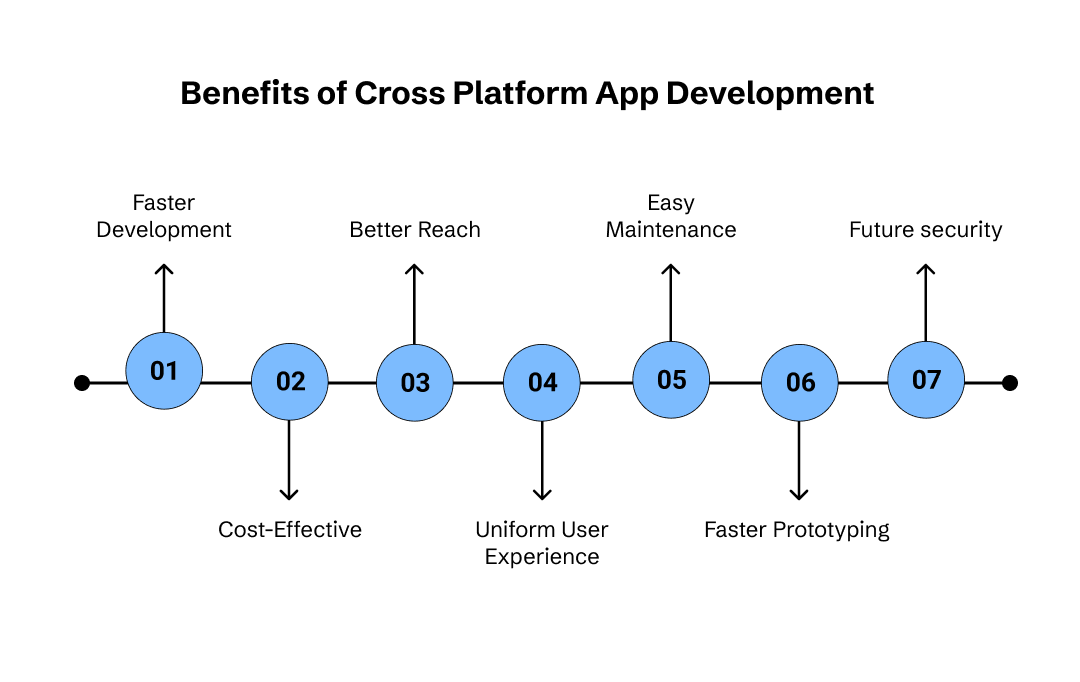
1. Faster Time to Market
With a single codebase for multiple platforms, development gets faster. This makes the app launch quicker and helps capitalize on market opportunities faster.
2. Cost-Effective
Cross-platform mobile application development allows code reusability. This allows SMEs to have a smaller development team.
3. Wider Reach
One of the primary benefits of cross platform app development is that it helps a single app reach more users. It can cater to both Android and iOS audiences, thereby expanding the user base. This translates into wider market reach and increased brand recognition.
4. Consistent User Experience (UX)
It allows a consistent look and feel across platforms. This ensures familiarity, which is essential for branding. Cross-platform mobile application development tools maintain a consistent look and feel. This promises a familiar experience to users regardless of the devices they are using.
5. Easier Maintenance
A single codebase doesn’t require multiple bug fixes for different platforms. Additionally, managing a single code is inherently less complex than dealing with multiple ones. This simplifies debugging, testing, and optimizing the app.
6. Faster Prototyping
Faster development makes cross-platform mobile app development ideal for prototyping and testing ideas. It can put the app in front of users and gather feedback earlier.
7. Future-Proofing
Cross-platform frameworks are evolving to support new tech and features. This helps in keeping apps relevant and adaptable to future developments.
Understanding the Best Programming Languages for Cross-Platform App Development
Let’s understand the key languages that empower app developers to create versatile and high-performing apps for multiple platforms. This section will give you an understanding of the best mobile app development languages that can help in streamlining the process and maintaining a consistent user experience throughout.
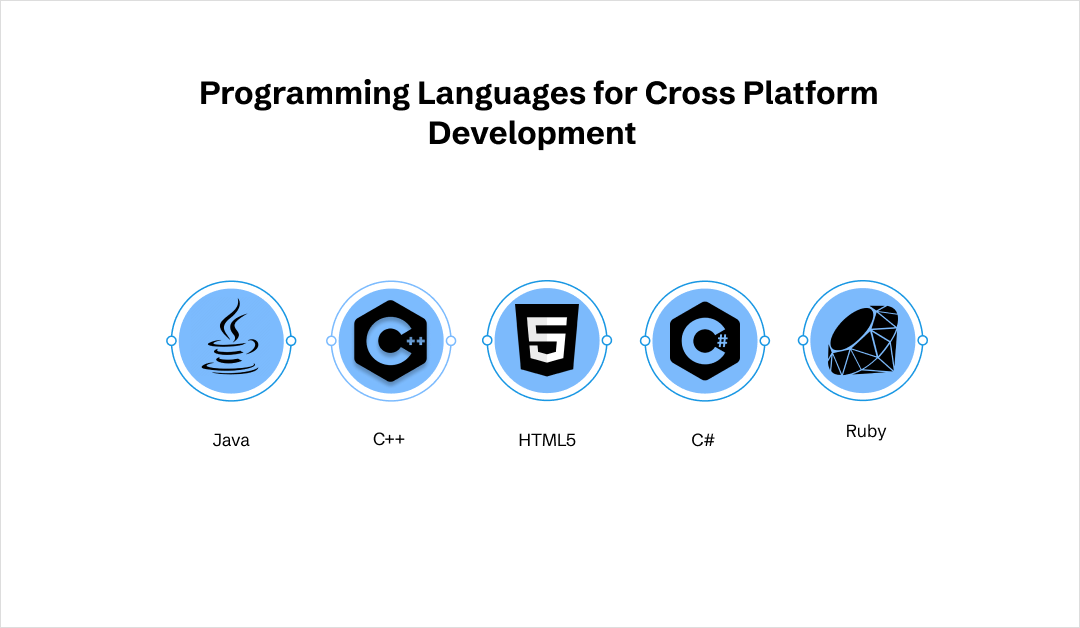
1. Java
It’s the core language for Android. Java is concurrent, class-based, object-oriented, and specially designed to have as few implementation dependencies as possible. Java’s ‘write once, run anywhere’ philosophy makes it an ideal programming language for developing cross platform applications.
Here’s why Java is a preferred language for cross platform app developers:
- With Java Virtual Machine or JVM, app developers can achieve full platform independence. A Java code can easily be executed on any device with a JVM. This feature enables mobile applications to run on multiple operating systems.
- Java is best known for its rich ecosystem as it supports a range of libraries, frameworks, and advanced tools that facilitate cross platform mobile application development.
- Java is a foundational language for Android app development. It offers extensive support and use within the Android app development ecosystem.
- Java offers the best performance and scalability as compared to other programming languages. It thus ensures that the apps run smoothly across different platforms.
2. C++
It is a general-purpose programming language and is not as advanced as Java. C++ possesses imperative, object-oriented, and generic programming features that suit the cross-platform development project.
Here’s why app developers invest in C++ for cross platform mobile apps development:
- C++ is suitable for applications that demand real-time processing as it allows developers to write a code close to the hardware.
- C++ is inherently portable across different platforms. Developers can easily write code that compiles and runs across different platforms, including iOS, Android, and more.
- C++ is a versatile choice for cross platform app development as it is compatible with other programming languages as well.
- Due to its high performance and excellent control over system resources, C++ is the best choice for game development.
3. JavaScript and HTML5
It is a high-level, interpreted programming language used for HTML5, the markup language designed to make mobile apps compatible with desktops. If clubbed together, these languages make for an impressive choice for cross-platform development.
Here’s why JavaScript and HTML5 is a suitable choice for cross platform app development:
- With HTML5, developers can easily enhance the capabilities of web applications.
- HTML5 supports a responsive design, enabling web applications to adapt to different screen sizes and resolutions.
- With this programming language, applications can run easily in low-network conditions or even offline.
- When combined with JavaScript, HTML5 enables the development of hybrid applications that run on multiple platforms.
4. C#
It is a multi-paradigm programming language equivalent to the Objective-C. The programming language is imperative, declarative, functional, generic, object-oriented, and component-oriented programming disciplines that have lately become a popular choice for cross-platform developers.
Here’s why C# is a suitable choice for cross platform app development:
- C# improves development efficiency and code quality by offering modern and object-oriented features.
- C# benefits from a powerful suite of development tools, including Visual Studio and Visual Studio Code.
- C# has a large and active community supported by Microsoft and a wealth of online resources, forums, and documentation.
5. Ruby
The language was designed and developed in the mid-1990s in Japan. Ruby is a mobile-specific programming language with elements like reflective, object-oriented, general-purpose, and interpreted.
Here’s why Ruby is a suitable choice for cross platform app development:
- Ruby is primarily preferred for its clean and readable syntax, which emphasizes simplicity and ease of use.
- Ruby itself is great for Android and iOS cross platform development strategies. The platform also caters to additional operating systems like Windows, macOS, and Linux.
- RubyMotion is a framework that allows developers to create native iOS and Android applications using Ruby.
- Ruby has a strong and active community that contributes to its ecosystem through open-source libraries and tools.
Popular Frameworks and Tools Used in Cross-Platform Mobile App Development
Let’s understand the most widely adopted frameworks and tools in the industry that can be used for developing mobile applications for different platforms. As per the popular cross platform app development examples, the most used frameworks include the following:
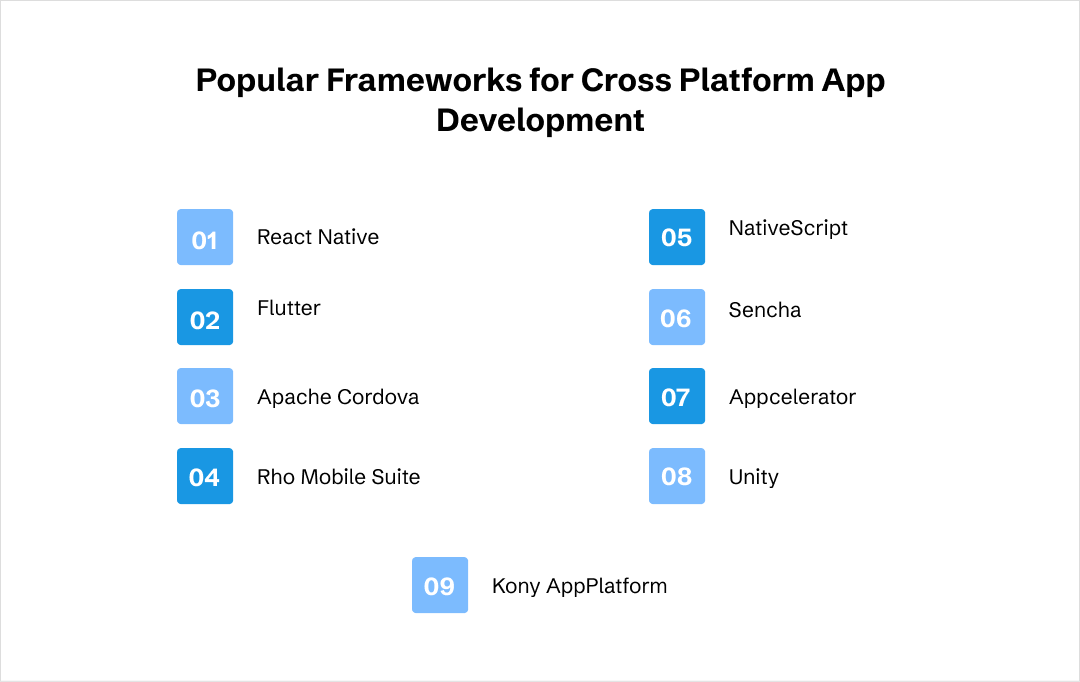
1. React Native
React Native is one of the most popular cross-platform app development frameworks out there. The framework is used to create native-looking apps with a single codebase. It utilizes JavaScript and native UI components to create apps that are smooth and responsive.
There are many reasons to choose React Native for cross platform app development. This framework delivers a large and active community. This helps with providing relevant libraries, tools, and necessary support.
2. Flutter
Coming from the house of Google, Flutter is an open-source cross-platform app development framework. It is capable of building beautiful, fast, and multi-platform apps. The framework can build apps for Android, iOS, web, desktop, and Fuchsia OS.
Flutter uses Dart as a programming language. This makes the learning curve steeper. But it has an incredible material design and a rendering engine. The combination helps create an app that is smooth and native looking.
3. Apache Cordova
Cordova command line runs on Node.js and is available on NPM. The popular cross-platform development framework offers features like reusable code across platforms, support for offline scenarios, access to native device APIs, and more. Apache Cordova uses JavaScript, CSS, and HTML5 for app development.
4. Unity
Unity mainly uses C# for coding and offers a wide range of resources for creators at every stage of learning. From free tutorials to in-person training, everything is best in class. The cross-platform game engine is created by Unity Technologies and caters to 2D, 3D, connected, and AAA games. Unity framework comes with a lot of freebies like free plugins, detailed documentation, and more. For better options, the company offers paid sessions for superior graphics and deployment. However, this can further lead to cost escalation.
5. NativeScript
It is an open-source framework for building truly native mobile apps with Angular, Vue.js, TypeScript, or JavaScript. With it, the developer can easily create apps on the Apple iOS and Android platforms using their native UIs and libraries. The best part of this framework is that it lets the developers use most JavaScript libraries that don’t rely on the internet.
6. Sencha
It is a user interface JavaScript library or web framework specifically built for the Mobile Web that offers various tools like Sencha Architect, Sencha Animator, and a few more. The enterprise-class Java and JavaScript frameworks provide developers with over a hundred professionally built and supported JavaScript components, including top-notch grids, delivering unmatched productivity.
Sencha product tools list include EXT JS, EXTReact, GXT, and Sencha Test. The most popular among them remains to be EXT JS, which is a complete JavaScript framework with a powerful UI component library that enables developers to quickly build and easily maintain data-intensive, enterprise web and mobile applications. The pricing remains a concern for the developers.
7. Appcelerator
It is an open-source framework that allows the creation of native mobile apps on platforms from a single JavaScript codebase. Appcelerator engages the common JavaScript language for creating native and cloud-connected mobile apps.
The platform offers a lot of features that help the developers to develop the apps easily. Furthermore, it provides an optional virtual private cloud option for mobile app development companies that handle sensitive and private data.
8. Kony AppPlatform
It is a low-code development framework that involves minimal development hassle. Kony’s visual design canvas and tools enable faster design and development. Designers and developers can integrate 100 percent of the native OS or any available open-source and third-party framework or choose a pre-built template - for a stunning user experience without sacrificing speed.
9. RhoMobile Suite
RhoMobile Suite is again an open source framework, which is used for creating data-centric, and native mobile Appcelerator consumer apps. It offers the liberty to the developers to test applications without the need for emulators or hardware and it better suits data-centric enterprise apps. The one thing that separates this framework from cross-platform development tools is that it provides automatic data encryption.
Comparing Cross-Platform Mobile App Development Frameworks
We have meticulously analyzed the leading cross platform mobile app development frameworks to provide you with a comprehensive comparison. This comparison will help you leverage the best tools and frameworks that will drive your app’s success.
| Framework | Main Language | UI Components | Performance | Development Popularity | Community Support | Platform Support |
|---|---|---|---|---|---|---|
| React Native | JavaScript | Native-like | Good | Very High | Very strong | iOS, Android, Web |
| Flutter | Dart | Customizable | Excellent | Rapidly Growing | Strong | iOS, Android, Web, Desktop |
| Apache Cordova | HTML, CSS, JS | Web View | Moderate | High | Moderate | iOS, Android, Web |
| Unity | C# | 3D/2D Game | Excellent | High | Strong | iOS, Android, Web, Console |
| NativeScript | JavaScript, TS | Native-like | Good | Moderate | Moderate | iOS, Android, Web |
| Sencha | JavaScript | Ext JS Framework | Moderate | Moderate | Moderate | iOS, Android, Web |
| Appcelerator | JavaScript | Native-like | Moderate | Low | Moderate | iOS, Android |
| Kony AppPlatform | JavaScript | Customizable | Moderate | Low | Moderate | iOS, Android |
| RhoMobile Suite | Ruby, HTML, JS | Web View | Moderate | Low | Low | iOS, Android, Windows |
Productive Editors and Integrated Development Environments(IDEs) in Cross-Platform App Development
Productive editors and IDEs are uniquely designed software tools that can enhance the productivity of developers. These tools are effective in writing, editing, and managing the codes effectively. Let’s discuss some of the most common examples of product edits and IDEs.
1. IntelliJ
Every aspect of IntelliJ IDEA is specifically designed to maximize developers’ productivity. Together, powerful static code analysis and ergonomic design make development not only productive but also an enjoyable experience. After IntelliJ IDEA indexes your source code, it offers blazing fast and intelligent experience by giving relevant suggestions in every context: instant and smart code completion, on-the-fly code analysis and reliable refactoring tools.
2. Visual Studio
It is an integrated development environment (IDE) from Microsoft. Visual Studio is used to create websites, web apps, web services, mobile apps, and computer programs. It uses software development platforms such as Windows API, Windows Forms, Windows Presentation Foundation, and more. Most importantly, it can produce both native code and managed code.
3. Cocos2D
It is a suite of open-source, game-development tools that is engaged in building games, apps and other cross-platform GUI based interactive programs. This tool is best for developing iOS apps. Being a framework, a single codebase covers C++, JavaScript, Swift, and Objective-C.
4. Qt
Qt is more than just an SDK. It's a technology strategy that enables the developer to quickly and cost-effectively design, develop, deploy, and maintain software while delivering a seamless user experience across all devices. Also, it lets you create fluid, high-performance, and intuitive UI, applications, and embedded devices with the same code base for all platforms.
5. MobinCube
This app builder requires no coding and is one of the preferred choices of budding developers. With its excellent visual interface, you can easily design your App. Initially, you just have to add pages to the app and then click, drag, drop, copy, and paste. The framework is quite flexible.
6. AppsMoment
Like MobinCube, AppsMoment is also a code-less platform that keeps you away from learning any of the web languages. The platform is perfect for app development for iPhone, iPad, Android, and Kindle. Here, the developers can create, customize, and publish their apps for free.
7. RubyMotion
It lets you quickly develop native apps for iOS, Android, and OS X, all using the editor and the Ruby language. RubyMotion features a statically-compiled version of the Ruby language designed for native mobile platforms, as well as a command-line-based extensible toolchain that will let you easily customize your development workflow just the way you like it.
8. Ionic
An Ionic Account offers more than just the open source tools. It allows web developers to build, grow, and scale cross-platform mobile apps. From the open-source framework to the Cloud Platform, the apps will be built faster. The app development platform offers more features with better packages.
9. Dropsource
It visually creates powerful, data-driven, truly native iOS and Android apps without writing any code. Dropsource further reduces time-to-market for individuals and businesses who don’t want to waste much time. Use Dropsource to prototype and build rapidly, then test and publish seamlessly. It eliminates the requirement for manual coding while still providing access to lean and editable native source code.
10. Yapp
It is a platform that allows you to create, edit, and instantly publish engaging mobile apps compatible with iOS and Android Devices. The platform focuses more on app building for events, conferences, and meetings.
11. Corona
It offers full-featured mobile event apps of all sizes. The Corona offers some very notable features like rapid app development, the liberty to add unlimited pages, instant publishing, unlimited updates, and much more. It further monitors the apps' installs, usage, and content statistics in real-time, which ultimately helps in making data-driven decisions about your event content and communication.
12. Xojo
The cross-platform lets you create the native user interface quickly and intuitively with a drag-and-drop option. With over 40 user interface controls built-in, the apps built here can fit any platform. Additionally, Xojo offers cloud hosting as well.
Proven Methods for Successful Cross-Platform Mobile App Development
Here is a list of cross platform app development best practices and optimal strategies that can help app developers build and deploy the best cross platform mobile applications.
For Design and Planning
Some important considerations to ensure the best design and planning of cross platform mobile applications include the following:
- Choose the right framework: Find one relevant to your project’s requirements. This could be the team’s expertise and the target platforms. Some popular options include React Native, Flutter, and Ionic.
- Prioritize core functionalities: Find the app's essential features. This ensures a seamless experience across platforms.
- Design for each platform: Optimize the UI/UX according to each platform’s design guidelines and user expectations. This helps maintain a consistent look and feel. It could involve customizing layouts, animations, and interactions.
For App Development
Some important considerations to ensure effective cross platform app development process
include the following:
- Leverage code reusability: The primary advantage of cross-platform mobile app development is code reuse. Try to write code components that are modular and reusable. This will help in streamlining development and maintenance.
- Use platform-specific features strategically: Integrating all the native features is not always possible. So, try to integrate platform-specific features. For this, use plugins or platform-specific code when necessary.
- Write clean and maintainable code: Try to maintain a clear code structure, proper documentation, and consistent coding practices. This helps build a sustainable codebase, especially when working with multiple developers.
For Testing and Deployment
Some important considerations for effectively testing and deploying cross platform mobile applications include the following:
- Test rigorously on multiple devices: Conduct thorough testing across devices and platforms. This is essential to ensure a smooth user experience and identify any compatibility issues.
- Implement continuous integration/continuous delivery (CI/CD): Automate testing and deployment processes. This helps with streamlining updates and bug fixes.
- Gather user feedback: Gather feedback from users consistently. This helps identify areas of improvement and ensures app relevance.
Additional Cross Platform App Development Tips
- Selecting the right tools can improve the project’s efficiency and success.
- Use cross-platform UI libraries to deliver a consistent user experience.
- Optimize performance using techniques like lazy loading, code splitting, image compression, etc.
- Implement responsive design using techniques like fluid layouts, flexible grids, and media queries.
- Implement encryption protocols such as SSL/TLS for transmitting sensitive information.
- Handle platform differences such as user behavior, device capabilities, and system APIs.
Navigating the Challenges of Cross-Platform App Development
The cross platform app development process can be challenging to navigate, even for experienced developers. Below is a detailed list of potential challenges that app developers may experience during the app development process.
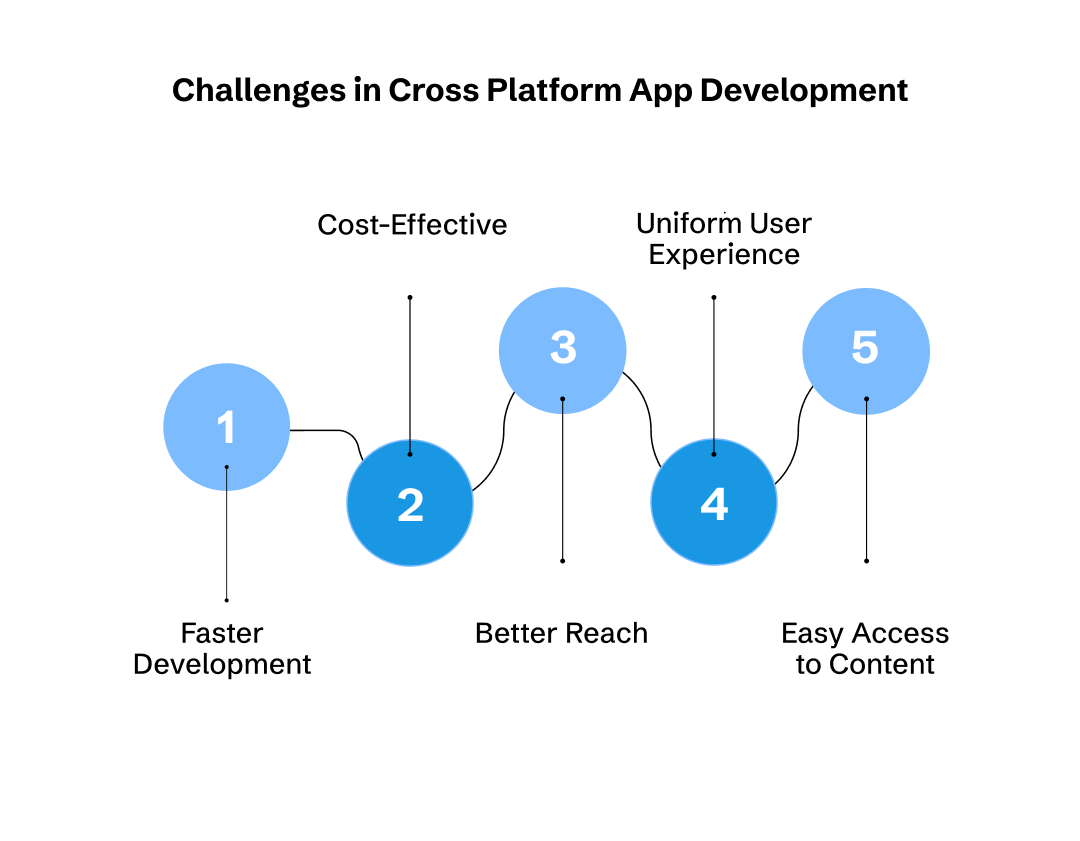
1. Limited Native Features
Cross-platform apps don't always have the latest features and functionalities. These frameworks need updates to support new features, which takes time. Also, the app might feel outdated in comparison to a native one.
2. Compromised User Experience
Cross-platform apps comprise a single codebase for different platforms. This might not create the most intuitive UX for each platform. For example, animations and functionalities might feel clunky or out of place.
3. Integration Issues
Integration of certain devices like GPS, cameras, or notifications can be tricky. These features need platform-specific code, which adds complexity to the development process.
4. Restricted Performance
Cross-platform might not perform well on older devices. It is because they add an abstraction layer. This layer fills in the gap between the app and the device's hardware.
5. Debugging Difficulties
At times underlying issues lie in the framework or the way they interact with other platforms. So, troubleshooting issues in cross-platform apps can be complex in comparison.
Top Global Success Stories in Cross Platform App Development
There are multiple mobile apps from around the world that have successfully harnessed the potential of cross platform app development. By leveraging powerful frameworks and adopting the single code approach, these app developers have successfully created mobile apps that ensure high performance. The best cross platform app development examples include the following:
1. Airbnb
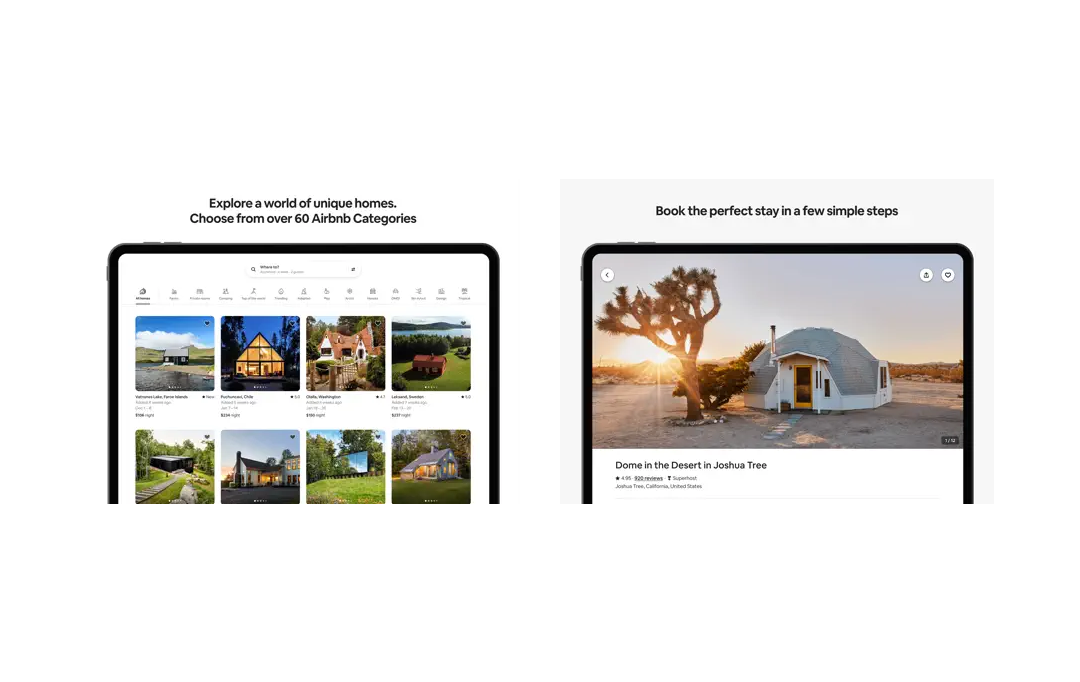
Airbnb is a revolutionary platform that has simplified the way people find and book lodging around the world. The app has successfully adopted cross platform app development to offer a unique and enriching experience for all its users. Some ways through which Airbnb embraced this unique approach include the following:
- Airbnb used React Native as its framework for app development. This framework has helped the company significantly reduce development time and save resources.
- It has used a single code across different platforms to ensure a consistent user experience across Android and iOS platforms.
- With a cross platform framework, Airbn can iterate quickly on new features and updates. It also ensures that the changes are implemented in a timely manner.
- React Natives’ active community and ecosystem provided Airbnb with access to a range of third-party tools, libraries, and resources.
2. Instagram
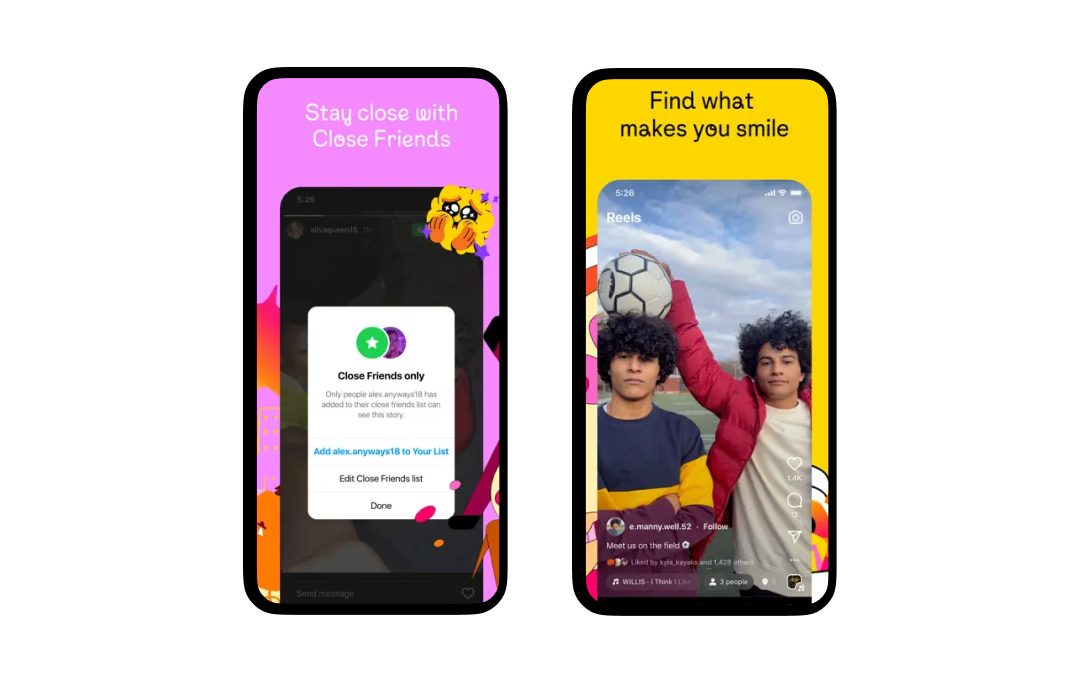
Instagram is a social media platform that has captured a huge audience by offering unique mobile applications for iOS and Android users. Initially, the app was only available for iOS users and later reached Android users to expand its user base. Here’s how Instagram became a success story of cross platform app development.
- Instagram app developers used a hybrid approach for app development. With technologies like HTML5, JavaScript, and CSS, the platform created a unified experience across iOS and Android platforms.
- In 2016, Instagram swiftly transitioned to React Native that allowed the developers to write app’s code base in Java Script and deploy it to the platforms.
- React native allowed Instagram to develop mobile applications with faster load times and smoother animations.
- React Native provided Instagram with access to native device features and APIs through JavaScript interfaces.
3. Skype
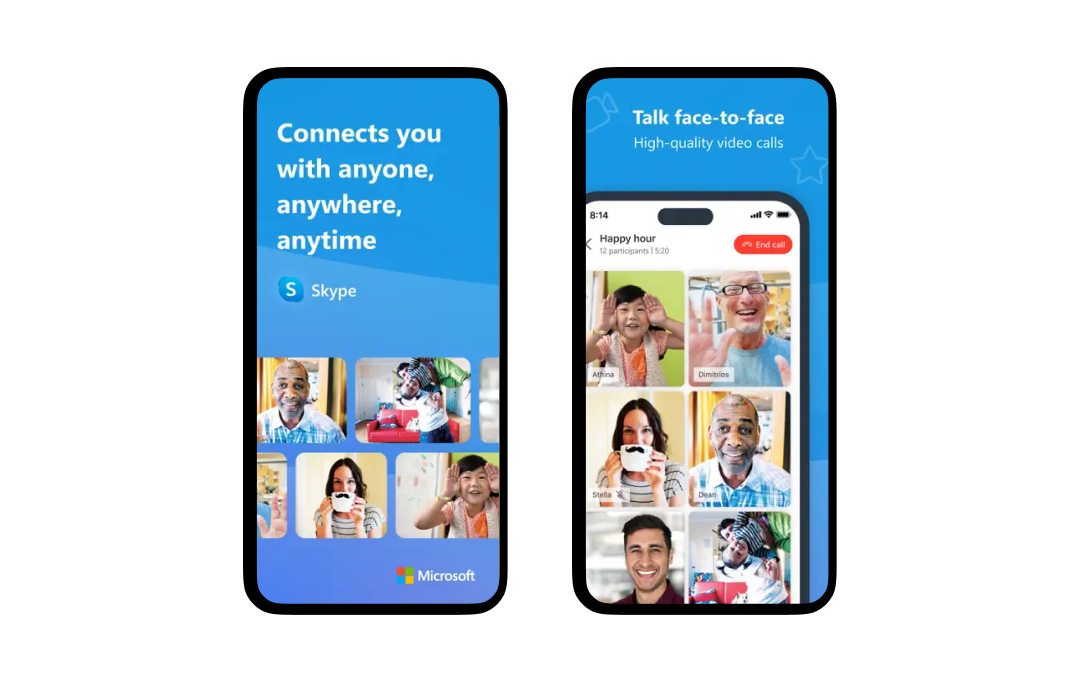
With the help of cross platform app development, Skype ensures that its communication platform is accessible and consistent across different operating systems. Here’s how Skype utilized cross platform app development tips to streamline experiences.
- Skype is available for Windows, macOS, iOS, and Android with the help of React Native framework. Each app is optimized as per the specific platform and user expectations.
- Skype maintains a uniform interface and consistent user experience across all platforms.
- Skype focused on ensuring synchronization of messages, call history, and contacts across all platforms.
Uber Eats
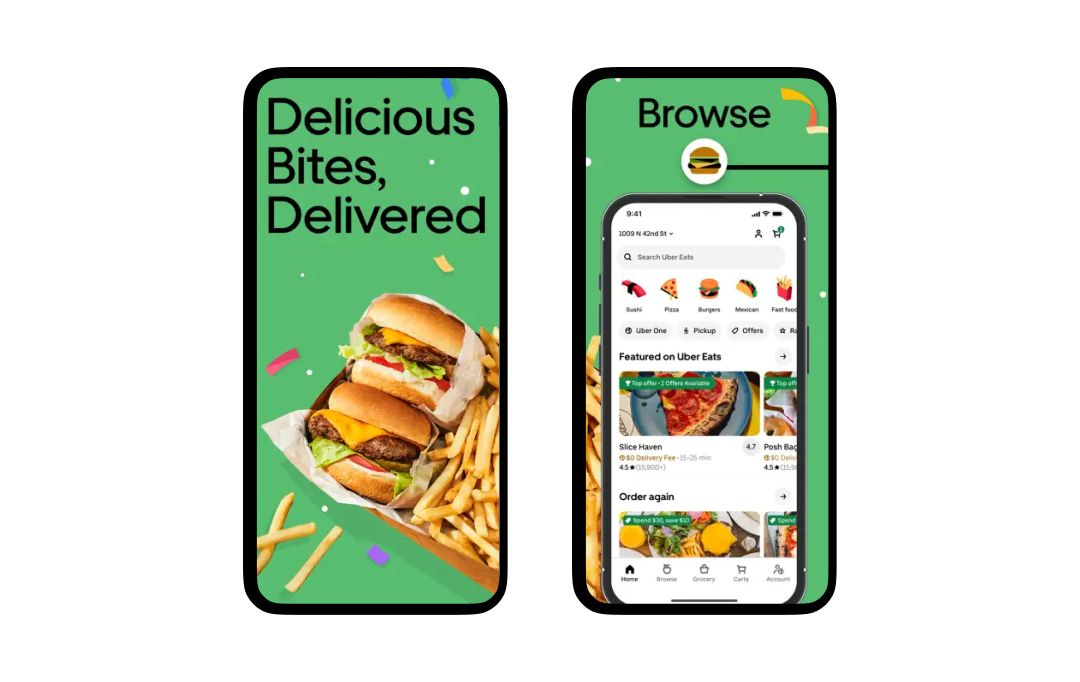
Uber Eats has effectively utilized cross-platform app development strategies to expand its food delivery service across various devices and operating systems. Here are some ways Uber Eats has leveraged cross-platform development:
- Uber Eats uses cross-platform frameworks like React Native to maintain a single codebase for its mobile applications on both iOS and Android platforms.
- By adopting cross-platform development, Uber Eats ensures a consistent user experience across different devices.
- Cross-platform frameworks like React Native enable Uber Eats to iterate more quickly on new features and updates.
- Although cross-platform frameworks may initially face challenges with performance, Uber Eats optimizes their applications to ensure smooth performance and responsiveness.
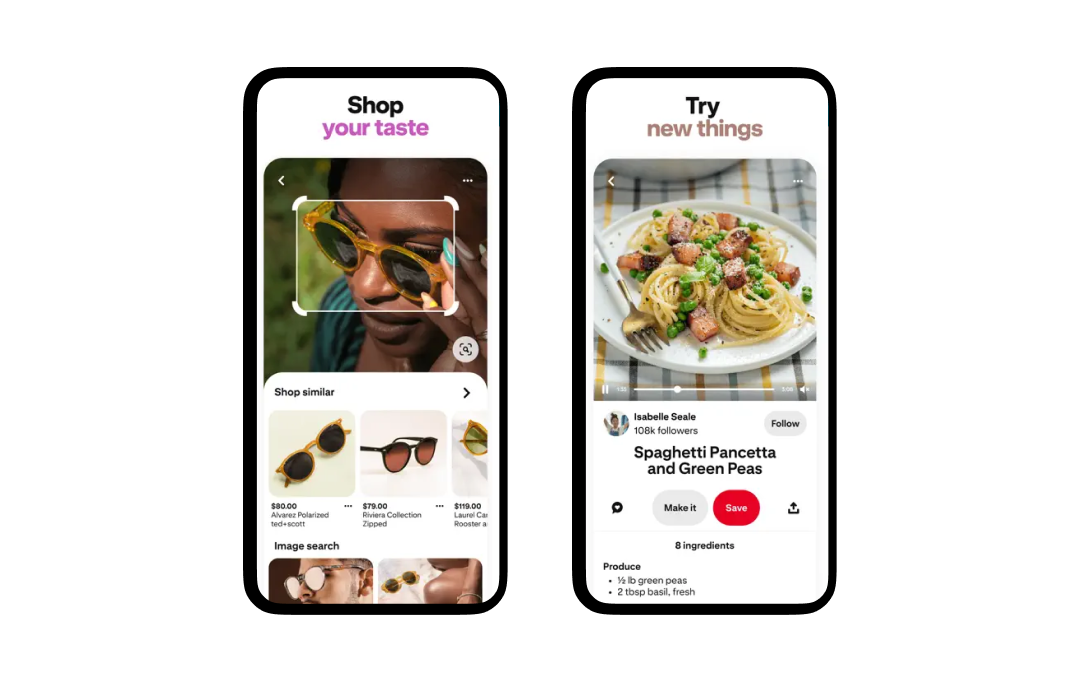
Pinterest is a visual discovery bookmarking platform that achieved success by harnessing the trend. Here’s how Pinterest became a name among the top cross platform app development examples.
- Pinterest adopted Google’s Flutter framework to ensure a consistent user experience for all across iOS and Android platforms.
- Cross-platform frameworks enable Pinterest to iterate quickly on new features and updates.
- Pinterest's cross-platform strategy allowed them to expand their reach to maximize user engagement. Cross-platform development allows Pinterest to scale its app effectively and reach a global audience.
- Pinterest utilizes APIs through JavaScript interface to integrate essential features such as camera access, location services, and notifications seamlessly into their app across different platforms.
Difference Between Native and Cross Platform App Development
On a surface level, the difference between native and cross-platform development may not feel stark. But, there are real differences from the perspective of development. So, let’s explore them:
| Feature | Native Development | Cross-Platform Development |
|---|---|---|
| Development Approach | Separate codebases for each platform (iOS, Android) | Single codebase for multiple platforms |
| Development Time | Slower - Requires building for each platform | Faster - Reuse code across platforms |
| Development Cost | Higher - Need separate development for each platform | Lower - Develop once, deploy on multiple platforms |
| Performance | Optimal - Leverages device-specific features | Potential limitations - May not match native performance |
| User Experience (UX) | Best-in-class UX tailored for each platform | Good UX, but might lack some platform-specific nuances |
| Access to Native Features | Full access to all native features and functionalities | Limited access, some features might require workarounds |
| Learning Curve | Requires platform-specific development skills (e.g., Swift for iOS) | Lower learning curve if familiar with the framework's language (e.g., JavaScript for React Native) |
| Development Team | Needs developers skilled in specific platform languages | Can leverage developers with broader web development skill sets |
| Target Audience | Specific platform users (iOS or Android) | Broad audience across different platforms |
| Community & Resources | Smaller, platform-specific communities | Larger communities with extensive resources for popular frameworks |
Choosing Between Native and Cross Platform App Development: Which is Right for You?
The choice between cross platform app development and native app development depends on a variety of factors and priorities of each project. Businesses must carefully evaluate these elements to make an informed choice for their app development process.
- Consider the project requirements: Before selecting an app development process, consider the specific project requirements. This includes assessing user experience expectations, performance requirements, and feature integration.
- Consider the budget and resources: Evaluate available resources, including development expertise and budget constraints, which may influence the choice of development approach.
- Consider the time constraints: If speed to market is critical, cross-platform development may offer advantages due to faster development cycles.
- Assess the long term strategies: Consider long-term maintenance, scalability, and future platform support when making your decision.
By considering these factors, businesses can make an informed decision that aligns with the strategic objectives, project-specific needs, and resource availability, ensuring a successful app development process.
Emerging Trends and Technologies in Cross Platform App Development: Beyond 2024
The rise of new development frameworks, and cross platform app development tools have completely transformed cross platform app development. Here are the latest technologies and emerging technologies that app developers and tech enthusiasts should watch out for.
1. Multi-Platform Frameworks Continue to Evolve
Cross platform frameworks like Flutter and React Native continue to evolve with advancing technology. These platforms continuously offer improved performance, better native module support, and enhanced developer tools. Cross platform frameworks enable developers to build highly performant apps across multiple platforms from a single codebase.
2. Machine Learning and AI Integration
Integrating machine learning and artificial intelligence capabilities into cross-platform apps is becoming more prevalent. Frameworks and libraries that simplify the integration of ML models, such as TensorFlow Lite and Core ML, enable developers to build intelligent features. With AI and ML, apps can offer a variety of features like image recognition, natural language processing, and predictive analytics into their apps.
3. Internet of Things (IoT)
As IoT devices proliferate, cross-platform development frameworks are adapting to support IoT integrations. Developers can build apps that interact seamlessly with IoT devices, collect sensor data, and control smart home appliances. The integration of IoT in cross platform app development enhances user convenience and improves process automation.
4. The Rise of Low Code/ No Code Platforms
No-code and low-code development platforms are empowering non-technical users and accelerating app development cycles. These platforms enable rapid prototyping, deployment, and customization of cross-platform apps with minimal coding required, making app development more accessible and efficient.
5. The Growth of Cross Platform Ecosystem
The cross-platform app development ecosystem is expanding with new tools, plugins, libraries, and community-driven resources. This growth fosters innovation, collaboration, and continuous improvement in cross-platform app development practices.
6. Augmented Reality and Virtual Reality Technology
AR and VR technologies are gaining traction in cross-platform app development, especially in sectors like gaming, retail, education, and healthcare. Cross platform app development frameworks like Unity and Unreal Engine provide robust support for building immersive AR/VR experiences across multiple platforms.
How Can MobileAppDaily Help Businesses with Cross Platform App Development?
MobileAppDaily offers a wealth of resources to help app developers and businesses with cross platform app development. Here’s how this platform can help:
1. Industry Trends and Tech Insights
MobileAppDaily is packed with resources and blogs that offer the latest information about emerging trends and cross platform app development best practices. This information is crucial for both businesses and app developers as it helps them stay updated.
2. Platform Comparison and Detailed Reviews
MobileAppDaily’s blogs and articles offer detailed comparisons of cross platform app development frameworks. This allows businesses to make an informed decision about what technologies and tools should be used in app development.
3. Directory of Development Companies
The platform features comprehensive directories on cross platform app development companies that connect businesses with app developers. With detailed information, businesses can easily partner with a suitable cross platform app development company.
4. Tech News and Updates
MobileAppDaily delivers the latest news and updates from the mobile app development industry, including advancements in cross-platform technologies, new tools, and frameworks. This keeps businesses informed about opportunities for innovation and improvement in their app development initiatives.
Conclusion
In conclusion, mastering cross-platform app development opens up a world of possibilities for modern businesses and developers alike. By leveraging cross platform frameworks teams can streamline development efforts, reduce time-to-market, and reach a wider audience.
As technology continues to evolve and frameworks improve, staying informed about emerging trends will be essential for staying competitive in the dynamic app development landscape. Whether you're embarking on your first cross-platform project or refining existing strategies, embracing the principles outlined in this guide will empower you to create robust, user-friendly apps that resonate with audiences worldwide.
Frequently Asked Questions
-
Is cross-platform development worth it?
-
Should mobile app development be native or cross-platform?
-
What is cross-platform app development?
-
What is the best cross-platform app development framework?






